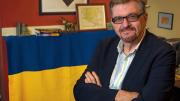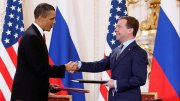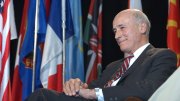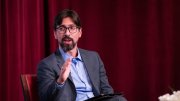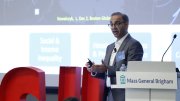On the day Russia launched its full-scale invasion of Ukraine, historian Serhii Plokhy was on sabbatical in Vienna, researching a new book about Chernobyl. He’d spent weeks sifting through documents in the archives of the International Atomic Energy Agency, sometimes long into the night. On what turned out to be his last working day there, February 24, 2022, he woke up at 6 a.m. to find an email from a Harvard colleague: “I hope you are OK,” it read. Immediately, he knew the war had begun. He was not OK.
Plokhy tells the story of that day in the opening pages of his most recent book, The Russo-Ukrainian War: The Return of History: how he phoned his sister back home in Zaporizhzhia, where explosions now thundered in the distance; how a colleague in Dnipro, just to the north, emailed to say he was evacuating the city and wanted to send “fragments” of his unfinished book to Plokhy, just in case. “We are well acquainted with the fate of manuscripts in wartime,” the colleague noted darkly.
Plokhy went to the archives as planned that morning—a few last boxes of Chernobyl papers were waiting for him to sort through—but all he could think about was the war in his home country. He wore a white shirt and dark blue blazer, “to show by my appearance that I was collected and prepared to carry out my duties, whatever they might be,” he writes. Absorbing the sympathetic gazes of fellow scholars and archivists as he moved through the building, he couldn’t help but wonder: had he dressed for a funeral? “I hoped not but did not know what to expect.”
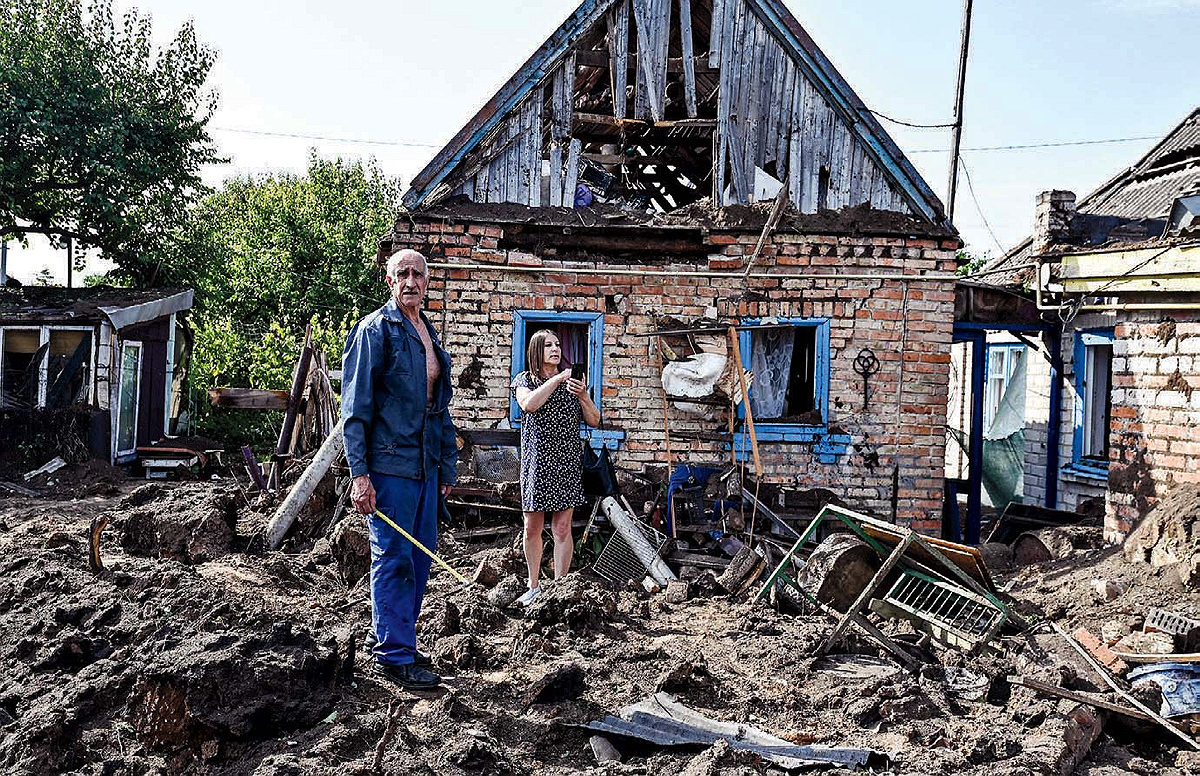
A homeowner in the village of Kushuhum, in the Zaporizhzhia region, examines his house and yard in the aftermath of Russian shelling. Photograph by Dmytro Smolienko/Ukrinform/Future Publishing via Getty Images
More than eighteen months later, Ukraine is still fighting, and Plokhy’s blue blazer hangs on a hook behind his office door at the Harvard Ukrainian Research Institute, where he serves as director, as well as Hrushevsky professor of Ukrainian history. His scholarly work covers much of modern and early modern Eastern Europe—particularly Russia, Belarus, Poland, and Lithuania—but his driving interest has always been Ukraine and its fascinating, tangled, often tormented history. The Russo-Ukrainian War, published in May, chronicles the first 10 months of the conflict. This was an unconventional undertaking: unlike the histories Plokhy is used to producing—written from a contemplative distance, after the explosions have ended and the outcomes are known—this book unfolds amid the chaos it seeks to explain, a chaos in which his friends and loved ones are caught up, with no clear ending in sight. The work is punctuated by grief.
It is also written from an unapologetically Ukrainian perspective. “I didn’t spend sleepless nights thinking about what side I should be on,” Plokhy says. “I basically consider this unprovoked aggression from Russia to be a crime, and I’m not prepared to pretend that there is an argument from both sides.” He emphasizes that it’s critical to get all the facts straight and present a truthful and clear-eyed account—without accuracy, nothing else matters—but his sympathies are unequivocal. “This is killing hundreds of thousands of people, and I’m on the side of the victim,” he says. “I’m very open about that. I can’t be on any other side, even if Ukraine were not my homeland.”
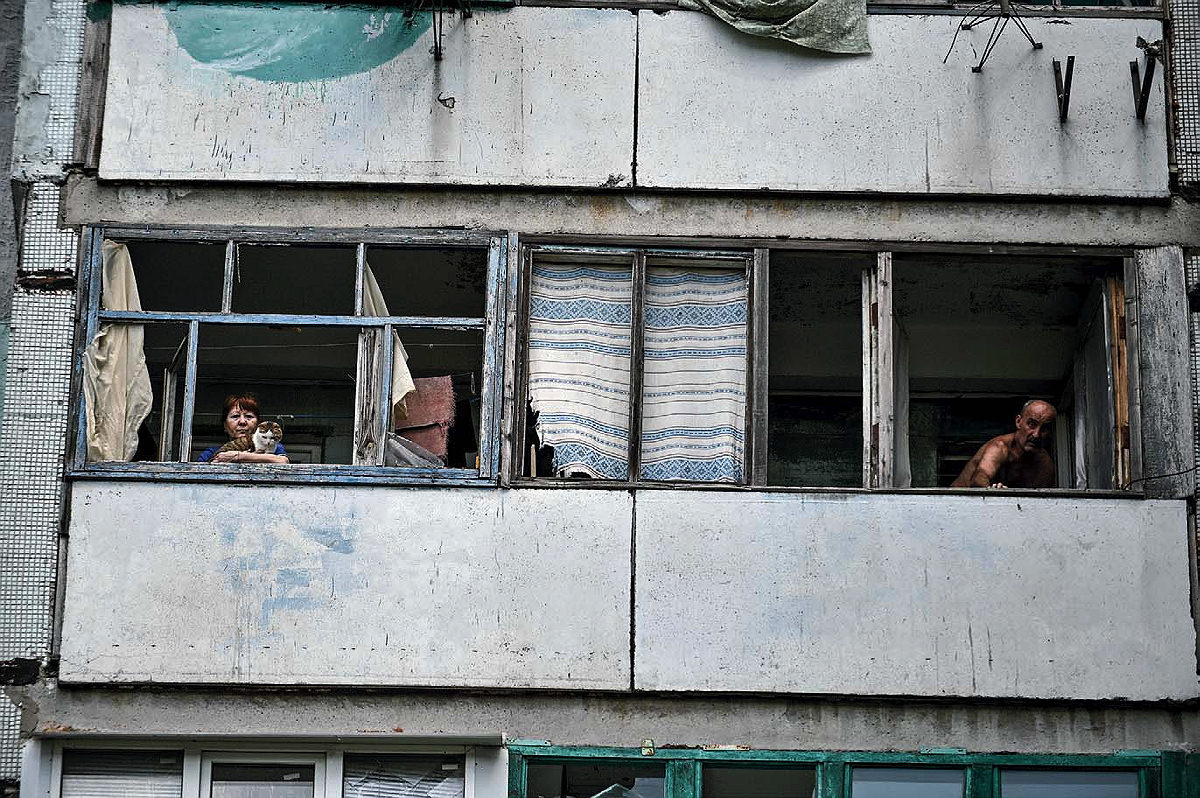
Residents look out from a damaged apartment building in Stepnohirsk, near the war’s front line.
Photograph by Dmytro Smolienko/Ukrinform/Future Publishing via Getty Images
The book begins and ends with deeply personal reflections. In the acknowledgments, Plokhy pays tribute to a cousin who was killed near Bakhmut last October. He also describes an email sent to him by a Ukrainian politician, enclosed with a photo of a soldier reading Forgotten Bastards of the Eastern Front, Plokhy’s 2019 book about American pilots on Ukrainian airbases during World War II. That soldier—the email-writer’s younger brother—had also been killed near Bakhmut. The photo was one of the last ever taken of him. Plokhy recalls struggling to find the right words to respond. “I did not find any,” he writes. “There were none.”
At first, he didn’t want to write this book. When his publisher raised the idea soon after the invasion—and then his agent did the same, and then a journalist acquaintance—he said no. “How can I write a book like that?” he remembers thinking. “Emotionally, I was absolutely not ready.” And as a historian, too, it seemed to contradict the basic premise of the job: “We’re supposed to be Monday quarterbacks, right?” he says. “That’s where the wisdom comes from.”
But as the shock wore off, he reconsidered. He felt that he had to do something to help, he says, and writing op-eds and giving interviews didn’t seem like enough. Plus, he saw how history itself had become a tool in the war. In speeches and essays justifying the invasion, Vladimir Putin had invoked what Plokhy calls “imperial misrepresentations” about the two countries’ past entwinement, grounding his arguments in a faulty but longstanding narrative of Ukraine as “the historical core of Russia,” as Plokhy puts it. In the book, he writes, “Most Russians believe today, as they have believed for centuries, that their state and nation originated in Kyiv.” Having spent much of his career trying to wrest Ukrainian history free from this mythology, Plokhy felt compelled to correct the record again. For him, this was the fight.
And so, the first several chapters of The Russo-Ukrainian War wade into the past. Plokhy revisits Ivan the Great’s war against the medieval city of Novgorod in 1471 (during which the “the myth of Russia’s Kyivan origins was born, originally as a dynastic claim,” he writes). He recounts the Cossack Hetmanate of the seventeenth and eighteenth centuries, the rise of the modern Ukrainian national project in the 1840s, the Bolshevik Revolution and short-lived Ukrainian People’s Republic, the long decades of Soviet rule, and the collapse and disintegration of the USSR (in which Ukraine played a pivotal role). The book describes how the two countries’ paths diverged during the 1990s, with Russia moving toward authoritarianism and Ukraine toward democracy. “Ukrainian democracy presented a major threat to the Russian political regime,” Plokhy writes, because it emboldened Russia’s liberal opposition and made it difficult for the Kremlin to regain control over Ukraine. Weaving toward the present, he traces the twenty-first-century convulsions—the 2004 Orange Revolution, the 2013-14 Maidan Uprising, and the Revolution of Dignity a few months later—that precipitated Russia’s annexation of Crimea in February 2014. That cataclysm, in which Russian special forces seized the Crimean parliament building in a predawn raid, was the true beginning of the current war, he says: “What we’re seeing now is a continuation.”
For historians, he’s concluded, “It’s important not to always wait until things are over before you speak.” The past makes the present legible, even as events keep tumbling rapidly, messily, relentlessly forward.
“I came back that December to see just complete collapse,” he recalls. “There was a feeling that everything important that had happened during my lifetime was gone.”
Huck Finn on the Dnieper
He’s had that feeling before. In December 1991, when Ukrainians went to the polls to vote overwhelmingly for independence—a referendum that effectively dissolved the Soviet Union on the spot—Plokhy was 34 years old, a young professor of history at the University of Dnipropetrovsk, finishing a brief sabbatical in Canada. “I came back that December to see just complete collapse,” he recalls. Even though the moment had been building for years, the shock when it arrived was overpowering. “There was a feeling that everything important that had happened during my lifetime was gone,” he says. “The country that was a superpower, that was supposed to go on forever, is gone.” Amid the chaos, Plokhy couldn’t help searching backward for answers to the Soviet empire’s crash: “The feeling was, the history of that country—and how it happened—that’s something important.”
Plokhy, who moved to North America in 1994 and arrived at Harvard in 2007, describes himself as “a child of the Cold War—on the other side of the Iron Curtain.” But his early life wasn’t as simple as that might sound. By the time he was growing up, “The Soviet ideology was already in crisis,” he says, and although the United States was officially an enemy, “no one really believed that—or, at least, no one in my generation.” He and his peers never fully trusted in the soundness of the Soviet economy, he says, or in Soviet dogmas. “And no one trusted the government too much.”
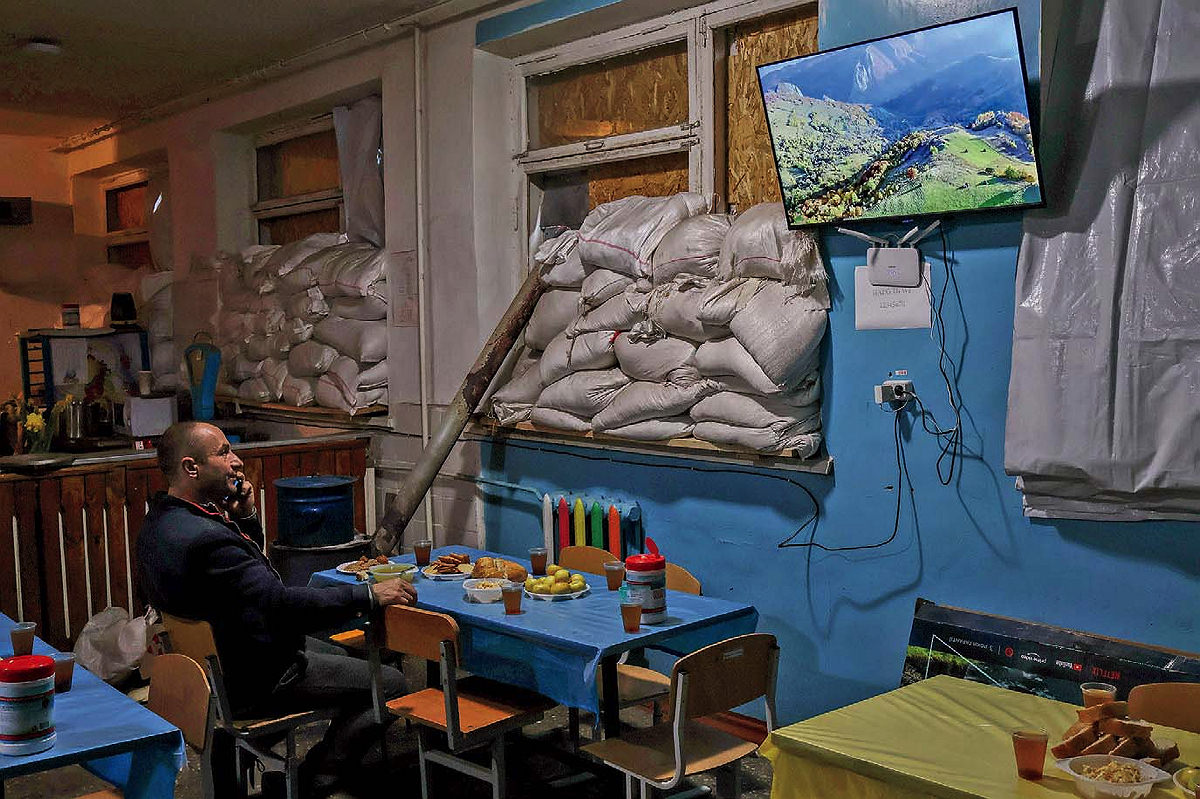
A local resident eats a free meal and talks on the phone at a shelter in Orikhiv, amid boarded-up windows and a TV displaying a more tranquil scene.
Photograph by Andriy Andriyenko/SOPA Images/LightRocket via Getty Images
It was also meaningful that Plokhy grew up in Zaporizhzhia, the historical homeland of the Ukrainian Cossacks, freemen and runaway serfs who had emerged in the late sixteenth century as a powerful military force. Led by their commander Hetman Bohdan Khmelnytsky, they rebelled against Polish rule in 1648, and then rebelled again 60 years later (this time unsuccessfully) against the Muscovite tsars, who’d been their allies in the fight against the Poles. Even after Peter I and Catherine II dismantled the Cossack state and integrated it into the newly formed Russian Empire, Zaporizhzhia remained a place where serfdom never took hold—its people have a long history of resisting foreign influence. Two centuries later, during the Russian Revolution, the largest peasant army allied with the Bolsheviks was led by Nestor Makhno, a Ukrainian anarchist from the Zaporizhzhia Oblast. “So that Cossack story was around me as well,” Plokhy says. And the story was not merely ambient; it was physical. Within Zaporizhzhia’s city limits sits Khortytsia, the largest island in the Dnieper River, inhabited by ancient Scythian ruins and the remains of a Cossack fortress, whose legend lit up the imaginations of Plokhy and his friends. “As schoolchildren, we were reading Mark Twain and Huckleberry Finn,” he says, “and I remember plotting with my classmates about how we would run away to that island and live there.”
The idea to study history as a formal discipline came, in a roundabout way, from Plokhy’s father, an engineer who’d grown up during World War II and then read about it constantly, in journals and memoirs from Red Army soldiers and histories translated from German. “There were a lot of discussions at the breakfast table about his experiences and about the books he read,” Plokhy says. Those discussions stuck: as a teenager considering his own professional path, Plokhy found himself interested in writing and decided to study history, on his way to what he thought would be a career in journalism. Instead, he kept plowing deeper into his academic studies—first at the University of Dnipropetrovsk, then the Peoples’ Friendship University of Russia, and finally the Taras Shevchenko National University of Kyiv—propelled by a fascination with the Cold War, the faltering Soviet empire, and his own country’s dramatic past.
In the decades since, Plokhy has become one of Ukraine’s foremost historians, and the shelf full of books he has written reflect lifelong preoccupations: from 2003’s Religion and Nation in Modern Ukraine, to 2012’s The Cossack Myth: History and Nationhood in the Age of Empires, to 2017’s Lost Kingdom: The Quest for Empire and the Making of the Russian Nation (a book triggered in part by Russia’s seizure of Crimea). In 2005, he published an intellectual biography of Mykhailo Hrushevsky, a towering Ukrainian historian and important forebear for Plokhy (as well as the namesake of his Harvard professorship), who helped establish Ukrainian history as a distinct field during the late nineteenth and early twentieth centuries and worked to disentangle the country’s national identity from the Russian imperial paradigm. In 2015, Plokhy published the book for which he is perhaps best known, The Gates of Europe: A History of Ukraine. It unpacks 2,500 years of history—from Herodotus’s descriptions of the Scythians in fifth-century BCE to the Maidan protests 10 years ago.
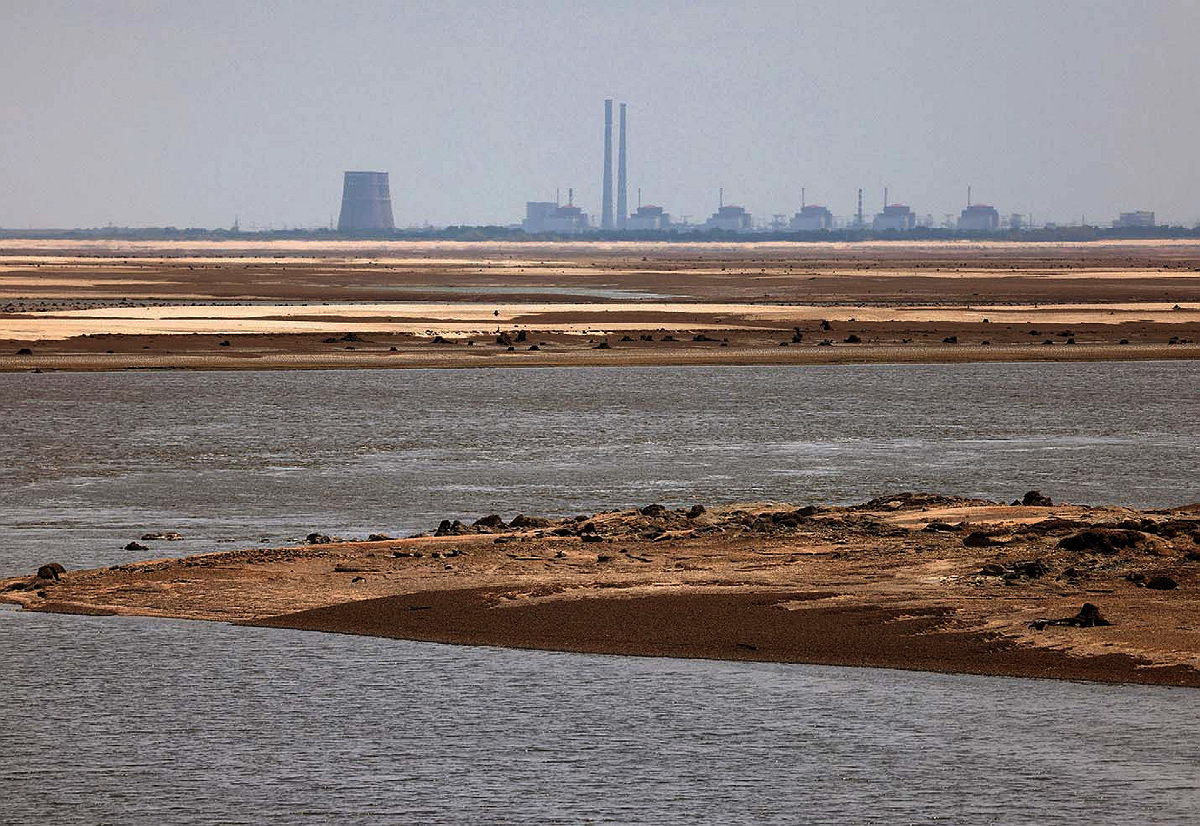
A July photograph shows the Zaporizhzhia nuclear plant in the distance, across from the now-emptied Kakhovka Reservoir.
Photograph by Anatoli Stephanov/AFP via Getty Images
More recent books—on the Chernobyl disaster, and the Cuban Missile Crisis—speak to Plokhy’s other abiding concern, one that’s not unexpected for a son of Zaporizhzhia. The city lies just northeast of the largest nuclear power plant in Europe, now trapped on the war’s front lines. In Atoms and Ashes: A Global History of Nuclear Disasters, Plokhy recounts more than a half-century of terrifying catastrophes; by the time the book appeared in May 2022, its details felt uncomfortably current. The Zaporizhzhia plant had been under Russian occupation since the first days of the invasion, and it became the focus of an unprecedented nuclear safety crisis, which has since escalated. Shelling and attacks have damaged the plant’s infrastructure and external power, and this spring, the destruction of the Kakhovka Dam emptied the reservoir that was its cooling source; in news reports, local residents compared the dry ground to a Martian landscape. Exacerbated by veiled threats from Putin, the fear of a nuclear disaster, caused by accident or sabotage, intensified.
Plokhy began sounding the alarm as soon as news of the invasion broke. In 1986, when the Chernobyl plant’s reactor core melted down, he was living downstream from the site, near the Dnieper River, with his wife and two small children. “I remember the horror of those days,” he told an interviewer years later, describing how he kept his children inside all summer. “We really didn’t know what to expect.” In the past year and a half, he has called for a new treaty banning the weaponization of nuclear sites and warned that a disaster at Zaporizhzhia could be worse than Chernobyl. In The Russo-Ukrainian War, borrowing a term from Ukrainian president Volodymyr Zelensky, he describes the occupation of the power plant as “Moscow’s nuclear blackmail of Ukraine.” The Russian invasion, he writes, “posed a nuclear threat to the world from its very inception.”
An Empire Disintegrates
In 2014, using a trove of newly declassified documents, Plokhy published a book called The Last Empire: The Final Days of the Soviet Union. In it, he countered the usual triumphalist American interpretation of the Soviet collapse. What doomed the superpower wasn’t U.S. foreign policy, Plokhy argued, but its own political structures and ethnic fractures, its imperial weaknesses. It “died the death of an empire,” he wrote, “splitting along lines roughly defined by ethnic and linguistic territories.” As Ukraine and then the other republics broke away, Soviet (and American) leaders were reacting to events, not steering them.
The Russo-Ukrainian War is framed around a similar argument. “What we’re dealing with is one of the wars of disintegration of empire,” Plokhy says. “It’s part of the story that started, arguably, with the American Revolution.” He doesn’t claim to know what will happen tomorrow, next month, or next year—nor how high the price will be for Ukraine and its citizens—but the ultimate outcome, he says, is already clear: “We know that empires disintegrate. We know that the former parts of empires emerge victorious. No major war since 1945 has been won by a global power, from Korea to Vietnam to Afghanistan.” He adds, “The collapse of the Soviet Union was not an event, but a process.” For the Russian Federation, the process is already under way. He points to the cascade of poor decisions that have characterized Russia’s military campaign. “This war has produced absolutely the opposite results from what Putin imagined”: not only Ukraine’s forceful resistance, but renewed unity among the West and NATO countries, and a loss of standing in Russia’s alliance with China. “It’s one miscalculation after another,” Plokhy says. “That says a lot about Putin, but it says even more about the current Russian form of government, that there’s this enormous leeway for him to make mistake after mistake without any correction.” After this war is over, he adds, “I think Russia will have to go back to thinking of itself as the Russian nation, not the empire.”
For Ukraine, too, the war has forced a national reckoning. Plokhy points to his hometown, in the southeast corner of the country, where Russian and Ukrainian are often spoken interchangeably (as a small child, he didn’t always know which words belonged to which language). “And now it’s a battleground where the Russian speakers demonstrate as much patriotism as the Ukrainian speakers,” he says. “That’s about Ukraine fighting back as a political nation rather than an ethnic or culturally defined nation.” In this war, he says, Ukrainians’ identity is determined by history, not language. “It’s an amazing phenomenon. We always read in political science textbooks about the ‘political nation.’ It’s this ideal model that is supposed to exist”—a country in which people cohere regardless of ethnicity, language, and cultural affinity—“but you can’t actually find it anywhere.” Except, he says, in Ukraine. “It’s right there: in the textbooks and in Ukraine.”
